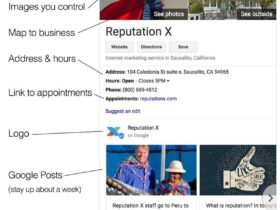This article covers how to report a predictive search autocomplete suggestion to protect your online reputation.
Google’s predictive search feature has improved the user experience and sped up the search process by offering suggested search terms that closely relate to the user’s original query.
Overall, autocomplete predictions have a lot of perks. They save time, help users choose the search queries that best match what they’re looking for, and add contextual suggestions that educate the user even more.
However, when a predictive search engine returns query suggestions that damage a brand’s or person’s online reputation, a lot of harm can follow.
Luckily, the Google search engine has policies in place to protect against dangerous and harmful search suggestions.
In this article, we’ll discuss how predictive search works and what to do if you come across suggested queries that violate Google’s policies.
Are predictive search suggestions making it hard to focus on your top business priorities or personal life? Get in touch with us today at
844-230-3803
to discuss harmful search predictions and take control of your online information.
What Is Predictive Search?
Predictive search, also called autocomplete, is a feature of the Google search engine that helps users find what they’re looking for faster when conducting an online search.
As you type a search query into the search bar, predictive search technology auto-populates longer and alternative search terms beneath the search bar.
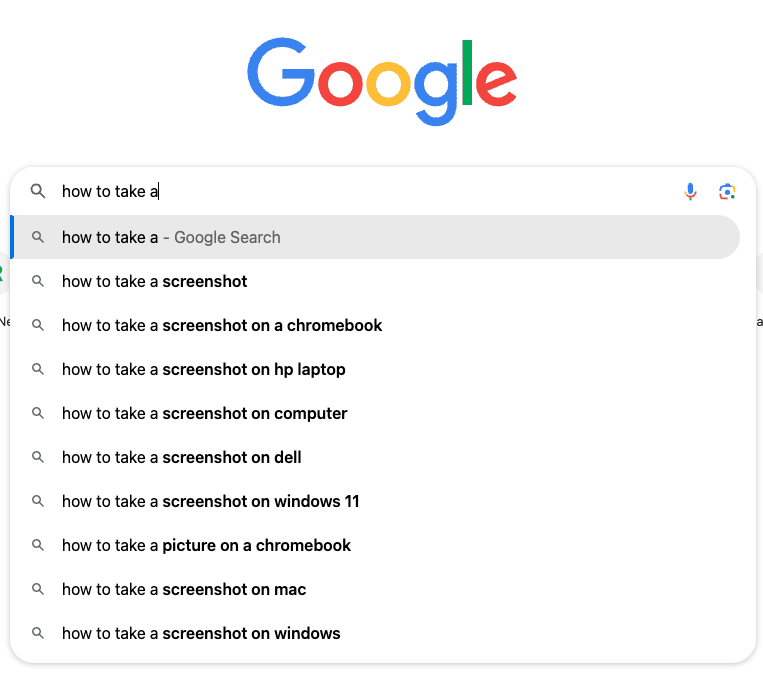
These predictive search results help the user quickly select what they’re looking for or add context to their search query.
However, while predictive search can be helpful when it comes to the user experience, the autocomplete feature can also lead to the spread of negative content online.
Why Would You Want To Report a Predictive Search Suggestion?
While Google’s predictive search results help users speed up the search process and find what they’re looking for faster thanks to suggested queries, it can cause damage to a business’ or individual’s online reputation in some cases.


For example, if you search for a person’s name and something like “criminal record” populates underneath, this can lead the user to think that the person has a criminal record — even if they don’t.
The same can happen with a brand. If users type a brand name into the search box and something like “scandal” or “lawsuit” shows up in the suggested query box, this can lead to assumptions about the business that may or may not be true.
Google’s Autocomplete Policies
Like other Google Search policies, there are guidelines for what should and should not show up in predictive search results. Autocomplete suggestions that are in violation of Google policies include the following types of content:
- Dangerous content
- Gore
- Harassment
- Hateful content
- Profanity and vulgar language
- Sexually explicit content
- Terrorism
- Violence
Moreover, there are specific rules for health- and election-related autocomplete suggestions, as well as sensitive information about individuals.
Election- and Health-Related Content
Autocomplete cannot contain election predictions that take a stance for or against a political figure or party. Predictive search also can’t make a claim about the electoral process’ integrity.
Additionally, Google predictive search cannot make claims that could be medically hazardous.
Sensitive Personal Information
According to Google, “We don’t allow predictions that associate potentially disparaging or sensitive terms with named individuals.” This includes autocomplete suggestions related to the following:
- Bullying
- Harassment
- Threats
- Sexualization
Furthermore, Google doesn’t allow predictive search tools to expose personal information that could cause the above offenses, along with financial fraud or identity theft.
How To Report a Predictive Search Autocomplete Suggestion
If you feel that a Google autocomplete suggestion violates the company’s policies, you can report the prediction. Here’s how to report a search term using your computer.
1. Go to Google.
Using a browser on your computer, go to the Google homepage.
2. Enter your search query.
In the Google search box, enter the search query that brings up the autocomplete suggestion you want removed.
3. Click the link to make a report.
At the bottom of the autocomplete window, click the link on the right that says Report inappropriate predictions.
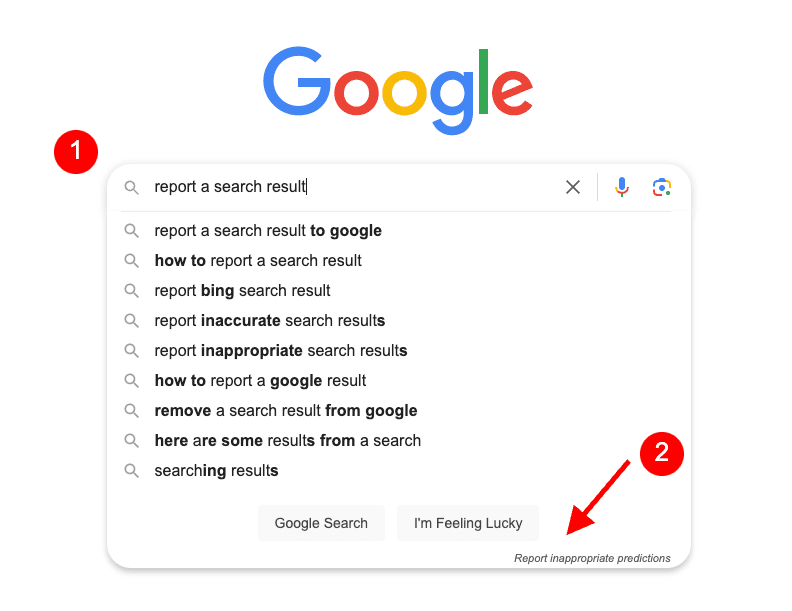

4. Select the correct autocomplete result.
Click the result that you want to report. You can only select one, so if there are multiple predictive search suggestions you want to report, you’ll need to repeat the process.
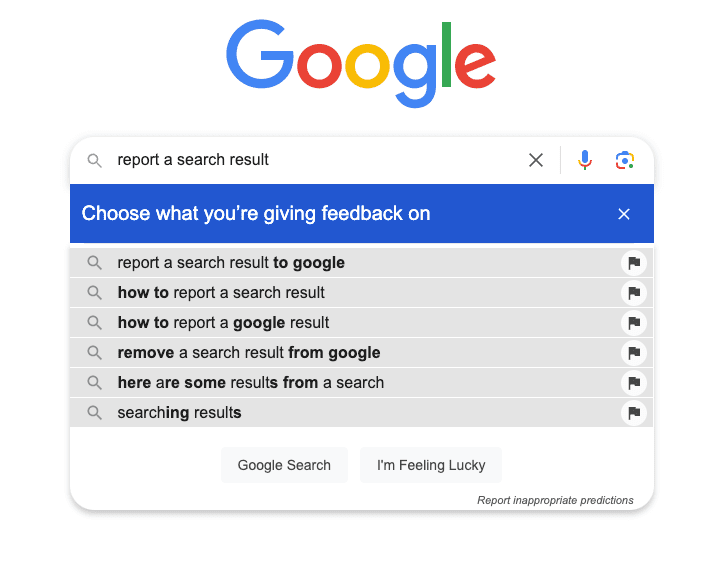

5. Choose the reason for your feedback.
There’s a long list of reasons to choose from. Select the one that most closely relates to your report.
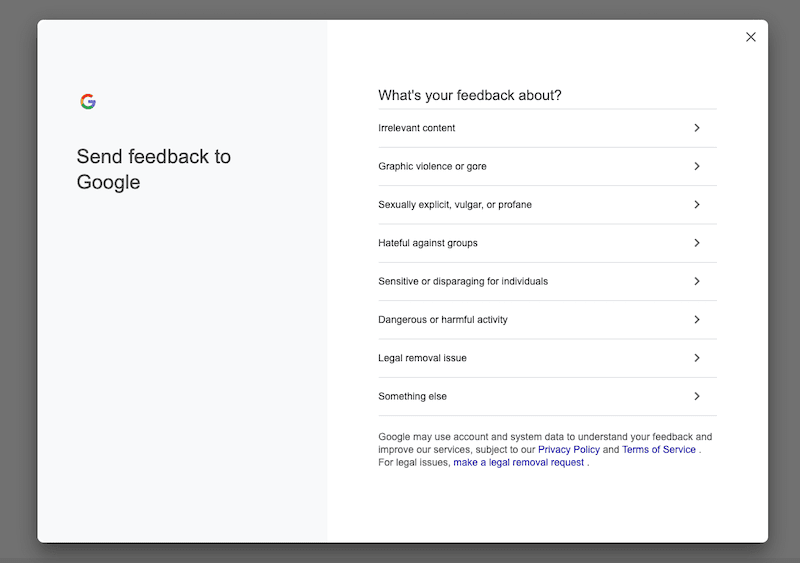

6. Add details about the predictive search suggestion.
You have the option to include information about why you want the predictive search result removed. It’s also helpful to include a screenshot to help the team assess your request. When you’re done, click the Submit button.
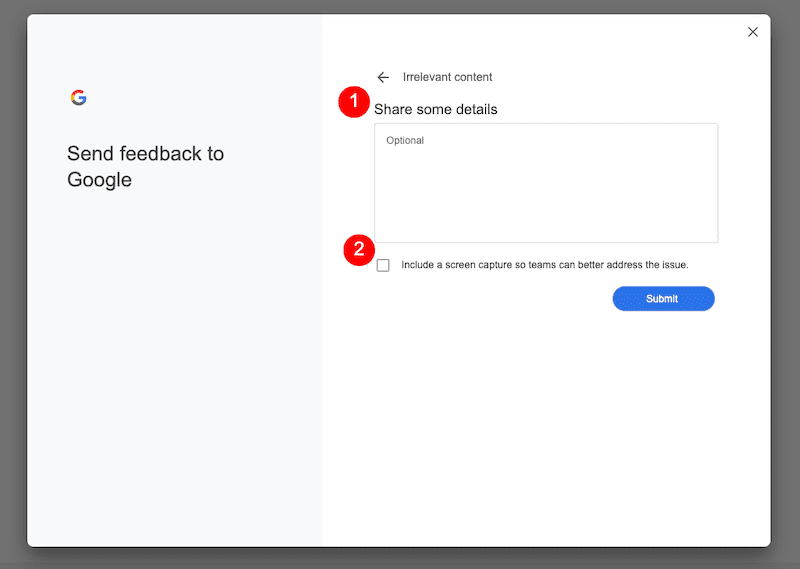

Note that while Google will analyze your request, reporting an autocomplete suggestion doesn’t guarantee that it’ll be removed.
Protect Your Digital Reputation
When it works as it should and doesn’t violate search engine policies, predictive search can improve the user experience. It can even help businesses and individuals by providing positive suggestions and adding context.
However, if predictive search is causing damage to your personal or professional online reputation, you’ll want to act fast before the problem gets out of hand.
Contact us today by calling
844-230-3803
to discuss keeping your digital reputation protected.









